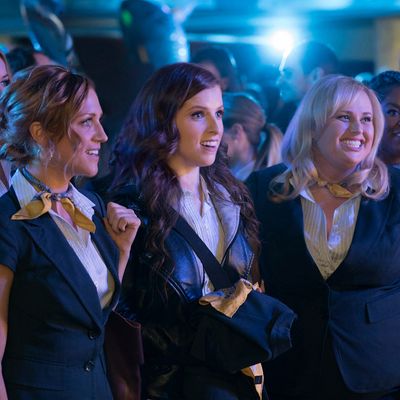
You are not going to find me complaining that the Pitch Perfect films have officially gone to cuckoo land. If the primary point of these films has been to produce sparkling autotuned a cappella renditions of some of the most relevant pop songs of the day, then I don’t really care if the Barden Bellas are singing at regionals or the Coachella main stage or an evil billionaire’s yacht in the French Riviera. When Pitch Perfect 3, the supposed final installation of the series, opens on the latter, I breathed a sigh of relief. At least this series doesn’t still think it’s about being a musician, I thought.
Unfortunately, I couldn’t have been more wrong: Pitch Perfect 3 finds the original Bellas adrift post-college, and our central protagonist Beca (Anna Kendrick) struggling with the realities of her dream career as a music producer. This means we’re treated to an early “ain’t rap a goof?” scene in which a Riff Raff type takes umbrage over Beca “improving” his track with her Bath & Body Works production sensibilities. Sick of her talents going to waste, she quits her job, then joins the Bellas on a USO/reunion tour (!) that’s also a battle of the bands (!!) where the prize is a record deal with DJ Khaled (!!!). Competing against bands with instruments for the first time, the group must defend their musical legitimacy. Their competition is fierce: among them, an all-girl rock band called Evermoist and a DJ that goes by the stage moniker DragonNuts. (Whatever Universal paid their punch-up writers, it was too much.)
The first Pitch Perfect movie worked because it was essentially a sports movie that had a sense of humor about its game — it realized how ridiculous so many aspects of competitive a cappella are, but also let the characters create a little magic with their supremely dorky art. Our surrogate was not any of the existing aca-alphas or a striving wannabe Bella, but a surly skeptic who thought she was too good for all that harmonizing and sisterhood. (Beca’s into real music, like David Guetta.) The movie makes you warm up to the squeaky-clean arrangements and improbable riff-offs alongside Beca, who inevitably realizes that the Bellas are indeed her tribe.
But once the question of whether or not Beca is a Bella is resolved, what are we left with? A still-kind-of-snotty Kendrick, whose unfortunate defining characteristic is her standoffishness, and the rest of the Bellas, who, aside from (the very good) Brittany Snow’s hapless try-hard Chloe, are nothing but a canvas on which to throw any gay and/or fat and/or Asian jokes that come to the writers’ minds. (Granted, this most recent film is far less egregious than the second installment.) Even still, that not-at-all-cohesive crew is much easier to root for than Beca herself, and Pitch Perfect 3 struggles most when it tries to make us care about her music career, and it tries a lot.
Even more curious is the material given to Rebel Wilson’s Fat Amy, who had become a full-on caricature in the last film and now is being asked to carry a long-lost-dad plot opposite John Lithgow. Neither seem to have any idea if their arc is supposed to be funny or not, nor do I. The film ends with a refutation of the usual “if you want to sign one of us, you sign all of us” band-movie cliché, which I appreciated. But it also ends with a sentimentality I didn’t buy — the Bellas don’t seem to particularly care about each other outside of a competitive setting, so why should we?




